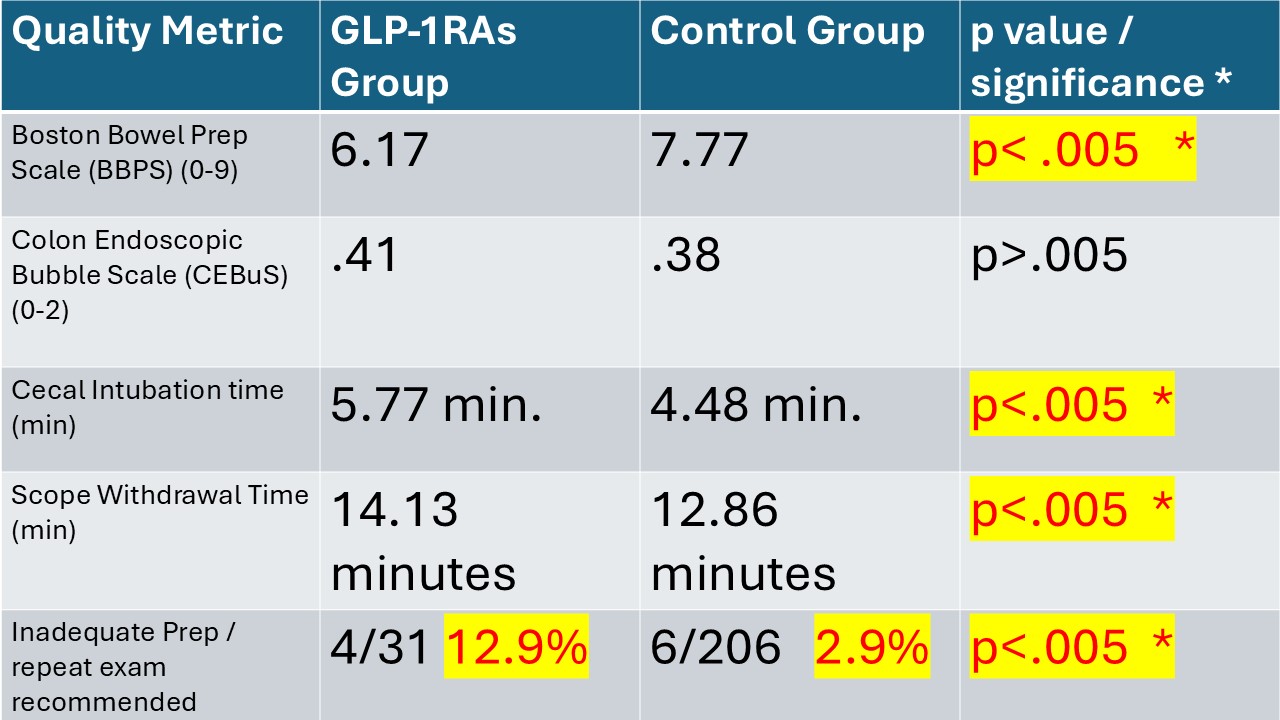Sunday Poster Session
Category: Colorectal Cancer Prevention
P0469 - Glucagon-Like Peptide-1 Receptor Agonists (GLP-1RAs) Significantly Impair Quality Metrics for Colonoscopy Preparations, Even When Held 7 Days Prior to Procedure
Sunday, October 26, 2025
3:30 PM - 7:00 PM PDT
Location: Exhibit Hall

Schyler McBride, BS (he/him/his)
NYIT College of Osteopathic Medicine
Glen Cove, NY
Presenting Author(s)
Schyler McBride, BS1, Charles E.. McBride, M.D., MD2
1NYIT College of Osteopathic Medicine, Glen Head, NY; 2Virginia Gastroenterology and Hepatology, Inc., Burke, VA
Introduction: GLP-1RAs have exploded in popularity, revolutionizing the treatment of diabetes and weight loss. In June 2023, the American Society of Anesthesiologists recommended weekly GLP-1RAs be held 7 days prior to sedated procedures over concerns of aspiration risk. More recently, Yao et al. (2024) reported in the AJG that GLP-1RAs negatively impact colonoscopy Boston Bowel Prep Scales, but did not consider the 7 day holding period, as their study, and all subsequent studies to date, have been retrospective, using data collected prior to the ASA recommendation. This is the first prospective analysis of the quality of bowel preparations when GLP-1RAs are held > 7 days prior to procedure.
Methods: From 260 patients, 237 patients were studied (121 males, 116 females, avg. age 64), excluding those deviating from prep instructions, non-consenting, or taking meds impacting motility. 31 patients were taking GLP-1RAs for diabetes or weight loss, with 206 control patients without any history of use. The GLP-1RAs group held injections for > 7 days prior to procedure. The endoscopist, blinded, recorded quality metrics, including the Boston Bowel Prep Scale (BBPS), Colon Endoscopic Bubble Scale (CEBuS), cecal intubation time, scope withdrawal time, and the number of repeat procedures from inadequate preps. The data was evaluated with paired t-tests (two samples / unequal variances) for significance.
Results: After holding > 7 days, GLP-1RAs recorded significantly lower BBPS (scored 0-9) compared to controls, averaging 6.17 versus 7.77 (p< .005). The cecal intubation time (minutes) was significantly greater for GLP-1RAs than controls, 5.77 vs 4.48 (p< .005). Scope withdrawal time (minutes) for the GLP-1RAs was significantly greater than for controls, 14.13 vs 12.86 (p< .005). 4/31 patients (12.9%) in GLP-1RAs required repeat colonoscopy due to poor prep vs 6/206 patients (2.9%) in controls (p< .005). There was no significant difference in CEBuS scores (scored 0-2) between GLP-1RAs and controls, averaging .41 vs .38 respectively (p >.005).
Discussion: Despite being held for 7 days, weekly GLP-1RAs negatively impact bowel prep quality, as evidenced by lower BBPS, increased cecal intubation times, increased scope withdrawal times, and the need for repeat procedures. While other factors contribute to these metrics, bad preps translate into longer cases and missed polyps. Our results suggest that targeting patients on GLP-1RAs with extended bowel preps might mitigate against inadequate colonoscopy exams.

Figure: GLP-1RA vs Control Quality Metrics
Disclosures:
Schyler McBride indicated no relevant financial relationships.
Charles McBride, M.D. indicated no relevant financial relationships.
Schyler McBride, BS1, Charles E.. McBride, M.D., MD2. P0469 - Glucagon-Like Peptide-1 Receptor Agonists (GLP-1RAs) Significantly Impair Quality Metrics for Colonoscopy Preparations, Even When Held 7 Days Prior to Procedure, ACG 2025 Annual Scientific Meeting Abstracts. Phoenix, AZ: American College of Gastroenterology.
1NYIT College of Osteopathic Medicine, Glen Head, NY; 2Virginia Gastroenterology and Hepatology, Inc., Burke, VA
Introduction: GLP-1RAs have exploded in popularity, revolutionizing the treatment of diabetes and weight loss. In June 2023, the American Society of Anesthesiologists recommended weekly GLP-1RAs be held 7 days prior to sedated procedures over concerns of aspiration risk. More recently, Yao et al. (2024) reported in the AJG that GLP-1RAs negatively impact colonoscopy Boston Bowel Prep Scales, but did not consider the 7 day holding period, as their study, and all subsequent studies to date, have been retrospective, using data collected prior to the ASA recommendation. This is the first prospective analysis of the quality of bowel preparations when GLP-1RAs are held > 7 days prior to procedure.
Methods: From 260 patients, 237 patients were studied (121 males, 116 females, avg. age 64), excluding those deviating from prep instructions, non-consenting, or taking meds impacting motility. 31 patients were taking GLP-1RAs for diabetes or weight loss, with 206 control patients without any history of use. The GLP-1RAs group held injections for > 7 days prior to procedure. The endoscopist, blinded, recorded quality metrics, including the Boston Bowel Prep Scale (BBPS), Colon Endoscopic Bubble Scale (CEBuS), cecal intubation time, scope withdrawal time, and the number of repeat procedures from inadequate preps. The data was evaluated with paired t-tests (two samples / unequal variances) for significance.
Results: After holding > 7 days, GLP-1RAs recorded significantly lower BBPS (scored 0-9) compared to controls, averaging 6.17 versus 7.77 (p< .005). The cecal intubation time (minutes) was significantly greater for GLP-1RAs than controls, 5.77 vs 4.48 (p< .005). Scope withdrawal time (minutes) for the GLP-1RAs was significantly greater than for controls, 14.13 vs 12.86 (p< .005). 4/31 patients (12.9%) in GLP-1RAs required repeat colonoscopy due to poor prep vs 6/206 patients (2.9%) in controls (p< .005). There was no significant difference in CEBuS scores (scored 0-2) between GLP-1RAs and controls, averaging .41 vs .38 respectively (p >.005).
Discussion: Despite being held for 7 days, weekly GLP-1RAs negatively impact bowel prep quality, as evidenced by lower BBPS, increased cecal intubation times, increased scope withdrawal times, and the need for repeat procedures. While other factors contribute to these metrics, bad preps translate into longer cases and missed polyps. Our results suggest that targeting patients on GLP-1RAs with extended bowel preps might mitigate against inadequate colonoscopy exams.

Figure: GLP-1RA vs Control Quality Metrics
Disclosures:
Schyler McBride indicated no relevant financial relationships.
Charles McBride, M.D. indicated no relevant financial relationships.
Schyler McBride, BS1, Charles E.. McBride, M.D., MD2. P0469 - Glucagon-Like Peptide-1 Receptor Agonists (GLP-1RAs) Significantly Impair Quality Metrics for Colonoscopy Preparations, Even When Held 7 Days Prior to Procedure, ACG 2025 Annual Scientific Meeting Abstracts. Phoenix, AZ: American College of Gastroenterology.
